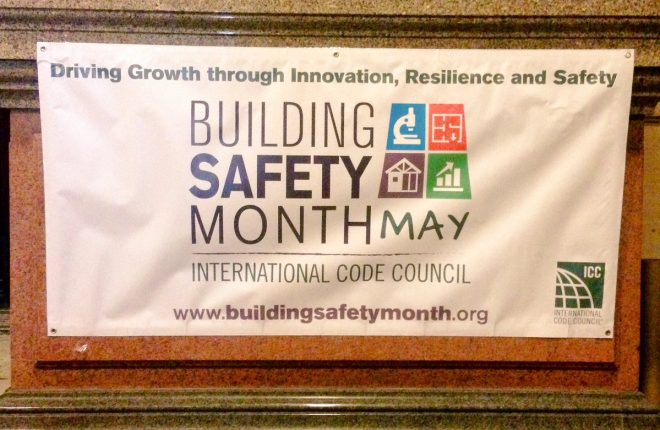by Philadelphia Office of Emergency Management | May 15, 2017
While we have little control over Mother Nature and the severe weather she brings, we can lessen the effects of natural disasters and storms through preparation, planning, and policy.
Hazard mitigation plays a key role in what the City’s Licenses and Inspections Department (L&I), Philadelphia Water Department, and the Office of Emergency Management does on an everyday basis.
May is International Code Council’s “Building Safety Month” and L&I is highlighting building safety by creating awareness and hosting events to help inform the public.
This week’s theme, Manage the Damage. Preparing for Natural Disasters, sees a confluence of City agencies’ efforts in public safety when it comes to your property.
Building safety is not just for construction-site managers and property or business owners. There are steps that homeowners or renters can take to be aware and prepared for some of the more common, and more hazardous, weather emergencies and natural disasters that Philadelphia experiences.
Be Ready
- Communication and preparation is key. Be informed. Sign up to get real time emergency information and weather updates from direct from the National Weather Service though the City’s mass notification system, ReadyPhiladelphia. Important information is sent to your phone or inbox and text or email, free of charge. Think of where you’d go and how you’d get there if told to evacuate. This should be part of your Family Emergency Plan. Account for all members of your family, including those more vulnerable or with access and functional needs and your pets.
Flooding
- Flooding can, and does, happen here in Philadelphia. It’s not just a problem for those that live near rivers and streams within the municipality: it’s a citywide hazard. In fact, Pennsylvania is one of the most flood prone states in the US. Urban areas, like Philadelphia, are most susceptible. Flooding can occur quicker as more water runoff is created in developed urbanized areas with less green space available. Urbanization increases runoff by 2 to 6 times over what would occur in natural terrain.
- Property check-up. The Philadelphia Water Department can help you give your house a check-up. Small problems, like cracks in the foundation, can become bigger issues with your home or building’s structural integrity. There are some common flood-prone areas in or around your home. Property owners can take proactive steps to protect damage or loss of property and valuables.
- Construction impact. The International Code Council classifies Philadelphia as bordering a hurricane-prone area. Still, the occurrence of severe storms with the high winds and flooding they bring is a concern to the City. Mayor Kenney has asked City Council to approve funding for a Floodplain Manager to ensure that construction projects in the areas most likely to be affected are designed to withstand flooding.
High Wind
- High winds can cause hazardous conditions. L&I wants both property owners and those on construction sites to be aware of dangers associated with high winds. Secure loose objects, including; trashcans, recycling containers, patio furniture, and outdoor signage at business properties or construction sites. When sustained winds reach 40 MPH, a High Wind Warning is issued by the National Weather Service. A cause for concern is that objects are propelled into people or property and also become a danger to vehicular or bike traffic.
- Construction sites. During high wind events, L&I urges construction sites to use extreme caution and secure loose materials, especially those on the upper floors of buildings under construction. Temporary fencing, signage and tarps at constructions sites must be lashed or otherwise secured.
Power Outages
- High winds and ice build up cause power outages. Trees topple, their limbs fall or ice weighs down lines. Know what to have in your head, your hands, and in your home if the lights go dim. This includes having you shelter-in-place kit stocked and ready to go.
- Reporting power outages and downed trees. Philadelphia’s power utility company PECO has ways to help before, during, and after a storm, including; preventing outages, storm readiness, storm restoration process, reporting outages online, and tracking current outages.
- Street light outage? Call Philadelphia’s non-emergency number 3-1-1. Street lights in the city of Philadelphia are owned and maintained by the city.
- Have a tree emergency? Philadelphia Parks and Recreation says if a tree falls during a storm and it’s blocking a road, or it has fallen on a house, car or other property, call 911. For non-emergency tree requests, please submit a request through Philly311. In the event that a tree has fallen on electrical wires, please call PECO’s emergency line: 1-800-841-4141. Do not approach.
Winter Weather
- Falling ice. Winter months that see snow, ice, fluctuating temperatures, and high winds can cause a danger to the public. The Department of Licenses and Inspections advises mid-and high rise building owners and managers to monitor their building facades and ledges for ice build-up. Ice that has melted enough to break free and fall from building surfaces can pose a threat to passersby below. Building owners are advised to take precautions such as placing barricades and warning signs around potential fall zones. Pedestrians are advised to be cautious and respect any temporary barricades erected on the sidewalk.
Follow Philadelphia Office of Emergency Management on Twitter. Like us on Facebook.

